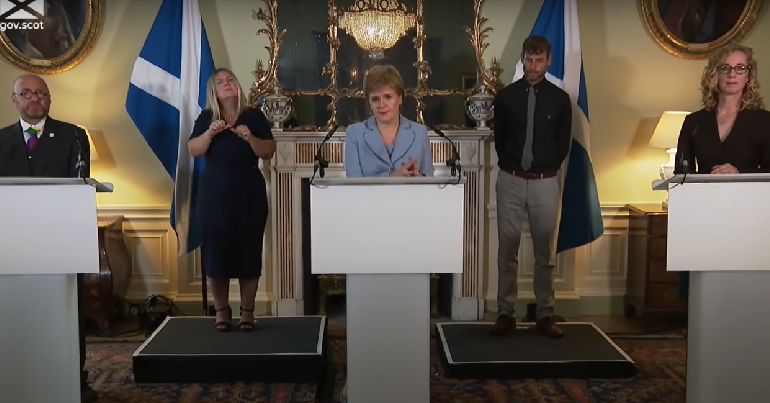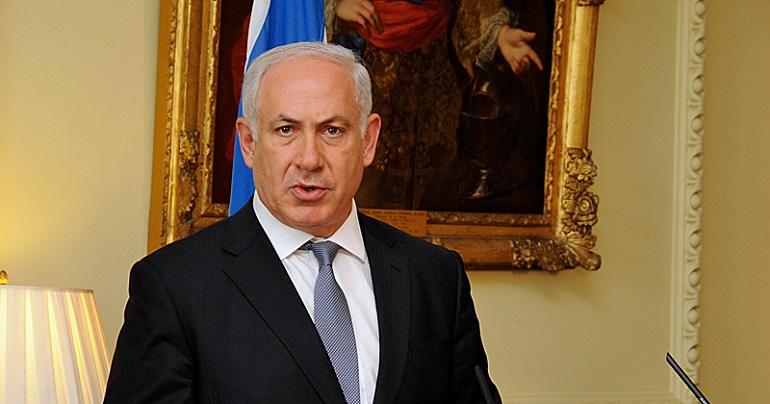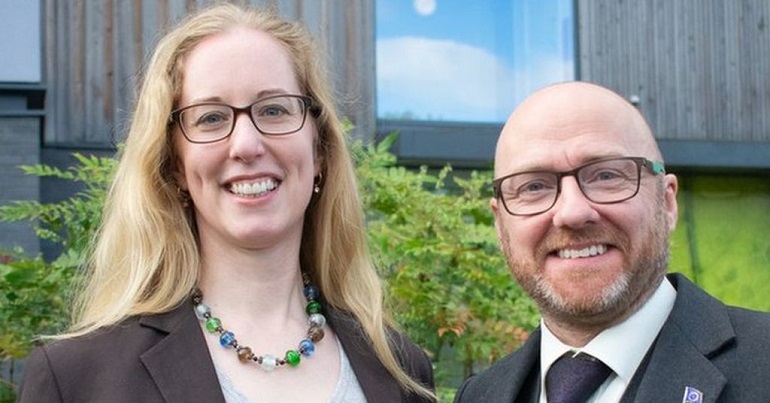South Africa: lessons for the SNP and for Radical Independence
Naomi Klein’s The Shock Doctrine has become a staple (some might say clichéd) reference point for many on the anti-authoritarian left. However in the lead-up to the Scottish independence referendum, and as the opinion polls show an increase in support for a yes vote, many minds in Scotland are turning to what will happen in the event of a yes vote. How will the negotiations be carried out with the rUK? How will Scotland’s constitution be written? Here, Klein’s chapter, Democracy Born in Chains shows a radically democratic path, and the pitfalls associated with abandoning that path. I should be clear that although there are lessons to be learned from the parallels, I’m certainly not comparing the cause of Scottish independence to the fall of apartheid and national liberation in South Africa.
The question of negotiations and a constitution are particularly pertinent to the left, and to movements such as the Radical Independence Campaign and its associated organisations, including the Scottish Green Party. The vision that Yes Scotland and the Scottish National Party puts forward for the future of Scotland is one which in many respects is not shared by the pro-independence left, most notably in terms of currency, the monarchy, membership of NATO, and other SNP policies outside the constitutional framework such as the lowering of corporation tax. And if promises of a cross-party negotiating team come to fruition, even this flawed SNP vision may well be the best of a bad bunch if Labour, the Lib Dems and the Conservatives have their say.
The process for writing a constitution seems more promising. The White Paper says that the new constitution will be written ‘by the people of Scotland, for the people of Scotland’, but it also makes reference to a constitutional convention, which implies a constitution written by the ‘great and the good’ in consultation with the people of Scotland. There are a lot of fuzzy lines in this area, which will likely become defined by real political power rather than by any particular principle. For the left, the question in both areas becomes how the people can take control and ownership of these processes where we can, and how to hold politicians’ feet to the fire where we can’t take that control. Here, Democracy Born in Chains offers some lessons.
The chapter deals with the transition to democracy in South Africa, and in particular with the principles of the Freedom Charter. This was, and still is in some ways, the document of core principles of the African National Congress and its allies under apartheid. Where the Green Party has its Philosophical Basis, and the Labour Party used to have Clause Four, the ANC has the Freedom Charter. This foundational document was written in the 1950’s in a very radically participative democratic way. As the ANC website itself explains:
In 1955, the ANC sent out fifty thousand volunteers countrywide to collect ‘freedom demands’ from the people of South Africa. This system was designed to give all South Africans equal rights. (…) The Charter was officially adopted on June 26, 1955 at a Congress of the People in Kliptown. The meeting was attended by roughly three thousand delegates but was broken up by police on the second day, although by then the charter had been read in full. The crowd had shouted its approval of each section with cries of ‘Afrika!’ and ‘Mayibuye!’
The volunteers ran through the townships and countryside with demands written on scraps of paper, taken from workplaces and public meetings, where the people were asked ‘what does freedom mean to you?’ The answers were radical and clear – “The people shall govern!”, ” The people shall share in the country’s wealth!”, “The land shall be shared amongst those who work it!” These demands were compiled and written into one document, and agreed by a mass assembly in Kliptown. In 2005 a monument to the Charter was unveiled in the same place – they literally carved the Freedom Charter into stone!

Image from http://en.wikipedia.org/wiki/File: Kliptown_Freedom_Charter_Memorial.jpg
The Yes Scotland ambassador scheme is a poor substitute for this process. Although their explicit aim is to recruit and train 10,000 volunteers to take the Yes message to the people, the aim is to talk, not to listen, and there are no links at all between it and the politicians who will negotiate the future. Importantly, and just like the impressive community organising that elected Barack Obama, these structures will not continue after the referendum. There’s a gap here waiting to be filled.
What if after the referendum, the left keeps canvassing, we build for public meetings in as many communities as we can and we ask, “the people voted for independence, so what does independence mean to you?” Even now in the ANC, candidates for selection are frequently asked “do you subscribe to the Freedom Charter?” Those who hesitate to say yes are not electedThere are other lessons to be learned from the South African transition. Through incompetence, inexperience or ideology, the ANC’s economic negotiating team, led by future President Thabo Mbeki, gave away the powers that would be necessary to fulfil the Freedom Charter. Mandela’s negotiations on the political transition were much more successful, but without the necessary economic tools, these successes made the ANC little more than a figurehead government, whilst the real power was wielded far away from the political sphere. As Klein explains:
Want to redistribute land? Impossible—at the last minute, the negotiators agreed to add a clause to the new constitution that protects all private property, making land reform virtually impossible. Want to create jobs for millions of unemployed workers? Can’t—hundreds of factories were actually about to close because the ANC had signed on to the GATT, the precursor to the World Trade Organization, which made it illegal to subsidize the auto plants and textile factories. Want to get free AIDS drugs to the townships, where the disease is spreading with terrifying speed? That violates an intellectual property rights commitment under the WTO, which the ANC joined with no public debate as a continuation of the GATT. Need money to build more and larger houses for the poor and to bring free electricity to the townships? Sorry—the budget is being eaten up servicing the massive debt, passed on quietly by the apartheid government. Print more money? Tell that to the apartheid-era head of the central bank. Free water for all? Not likely. The World Bank, with its large in-country contingent of economists, researchers and trainers (a self-proclaimed “Knowledge Bank”), is making private-sector partnerships the service norm. Want to impose currency controls to guard against wild speculation? That would violate the $850 million IMF deal, signed, conveniently enough, right before the elections. Raise the minimum wage to close the apartheid income gap? Nope. The IMF deal promises “wage restraint.” And don’t even think about ignoring these commitments— any change will be regarded as evidence of dangerous national untrustworthiness, a lack of commitment to “reform,” an absence of a “rules-based system.” All of which will lead to currency crashes, aid cuts and capital flight. The bottom line was that South Africa was free but simultaneously captured; each one of these arcane acronyms represented a different thread in the web that pinned down the limbs of the new government.
Although the context is very different, the lessons for the left and for the negotiators are clear. The Westminster parliament and government are utterly beholden to the interests of finance capital and the rich. Independence is an opportunity to cut off some of the control which the capitalist class wields over us through that establishment, but without effective scrutiny and accountability it will be too easy for the negotiating team and the writers of the new constitution to allow those existing channels of power to remain – through the monarchy or a currency union with the Bank of England – or to concede to a different section of the capitalist class the same control over Holyrood they currently enjoy over Westminster.
The SNP and Yes Scotland talk the talk on the sovereignty of the people of Scotland, and on the participative nature of the constitutional process. But action is more important – if they genuinely want the people of Scotland to have power over their own affairs, if they want genuine independence, and if they don’t want their reputations and legacies to lie in the gutter alongside Thabo Mbeki’s, then the following are necessary minimums:
- Our political, economic and monetary policies must be set as independently as possible from Westminster
- Our new political, economic and monetary institutions must be set up within the political/democratic sphere, and must be run democratically in the interests of the people
- The new constitution must be created using a democratic, participative process, and not by lawyers, politicians or technocrats.
Then, once we have these powers, we can begin to decide democratically what to do with them.




hola, if u make another government, the same thing will happen again. it is like a broken record. nowhere has the people attained freedom and justice in the whole world after any revolutions or gov’t. changes. making a constitution for a new gov’t is loco, in my opinion. it needs to have no central authority, no hierarchy (cuz it destroys everything eventually). i believe the only hope is self-organizing like occupy wallstreet for example, associations, full autonomy/ sovereignty of each citizen. in a word, real freedom for once. end of capitalism. something like our community (see facebook group: shambhalabamba)